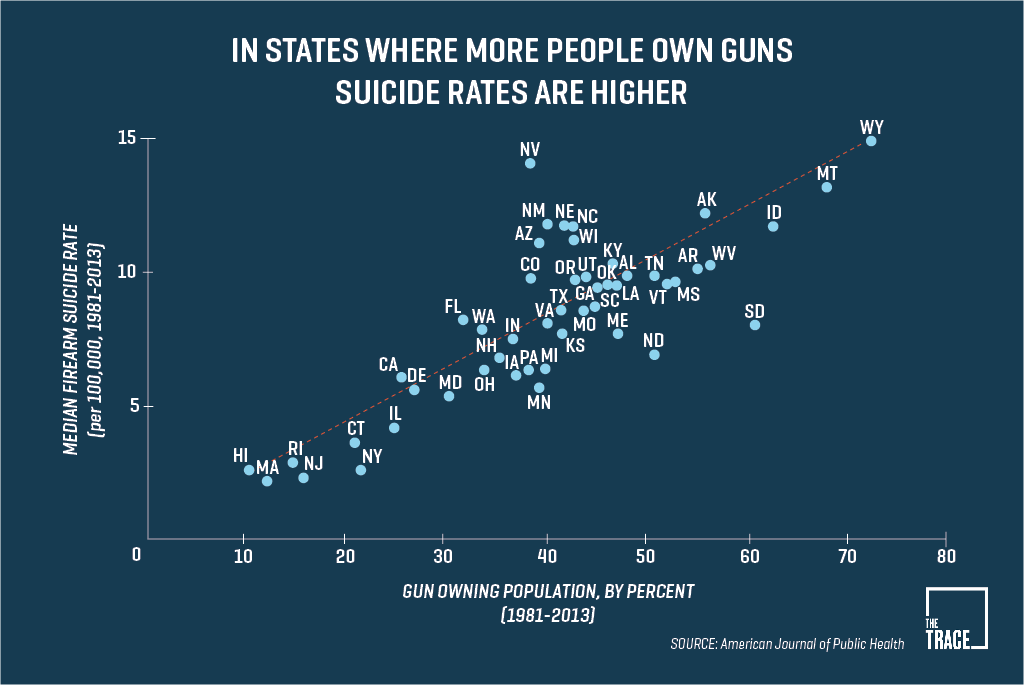The proven correlation between a state’s gun ownership rates and the number of gun suicides doesn’t seem to apply to Nevada. The state has a firearm suicide rate that’s nearly twice as high as the rest of the country — but the percentage of Nevada residents who are gun owners is relatively low.
From 1981 to 2013, Nevada’s gun suicide rate was nearly twice the national average, a study in the American Journal of Public Health recently concluded. It was second only to Wyoming. Yet, its gun ownership rate over that span was slightly below the national average. Based on the pattern set by other states, its gun suicide rate should be about the same as Pennsylvania, which is 6.4 per 100,000 residents. Instead, it is more than twice as high: 14.3 per 100,000 residents.
Guns are incredibly lethal, with more than 8 in 10 firearm suicide attempts proving fatal. So it isn’t likely that Nevadans are simply more successful in their attempts than other Americans — it is that they try more often.
According to the Centers for Disease Control and Prevention, in 2014 Nevada had the sixth-highest suicide rate in the nation. The state lies in the heart of the American suicide belt — an area in the West that includes other states like Arizona, Colorado, and Utah, where researchers have identified a geographic patterning of suicides. It has the highest overall suicide rate among senior citizens in the U.S., and the highest gun suicide rate among women.
So what accounts for the trend-defying disparities in Nevada? Researchers say it is impossible to identify a single explanation, but that gambling, social isolation, and an underfunded mental health system all likely play a role.
Las Vegas, which is home to a larger proportion of the state’s population than any other city, has been deemed the “suicide capital of America.” Residents of the city have a 50 percent higher risk of suicide than people living in any other city in the country. The most-cited reason for this striking statistical difference is the link between suicide and gambling. According to the Nevada Council on Problem Gambling, 17 percent of individuals with gambling disorders have attempted suicide, and up to half have thought about suicide (compared with 5 percent of the general population).

Researchers have also found that suicide rates are higher in rapidly growing populations. Clark County, which includes Las Vegas, is adding roughly 30,000 to 40,000 residents each year. When places grow so fast, social isolation, fragmentation, and lack of community cohesiveness — all of which are frequently correlated with suicide — increase.
Those most vulnerable to depression, and to suicidal thoughts, are “people who lose connection with others, with the community, with their family and friends, and become isolated and lonely,” Yeates Conwell, director of the Geriatric Psychiatry Program at the University of Rochester, tells The Trace.
The Nevada Crisis Call Center is a 24-hour suicide prevention hotline created 50 years ago in response to the high suicide rate in the state. The number of people calling has increased greatly in the last four years, and this year alone, the Center received over 65,000 calls and text messages from all over the U.S. — that’s an average of 178 calls every day.
Support services exist to help people at an elevated risk of suicide, but Nevada’s are not particularly well funded. The state ranks 43rd in the country in mental health spending per capita, according to the Commonwealth Fund, a private foundation that supports research on health care.
On Thursday, the Las Vegas Law Review Journal reported that Nevada spent about $89 per capita in 2013 on mental health services (a 13 percent increase from 2007). Neighboring states spend much more: California, for example, spends $160 per capita; Arizona spends $205.
“When it comes to mental health situations, we do not take care of people,” says Rachelle Pellissier, the Nevada Crisis Call Center’s executive director. “It’s really hard to get a doctor when you have a mental health issue, and the state just doesn’t have the funds it needs to put toward that.”
The National Suicide Prevention Hotline is 1-800-273-8255. It is available 24 hours a day.
[Photo: Flickr user Bruce Fingerhood]

